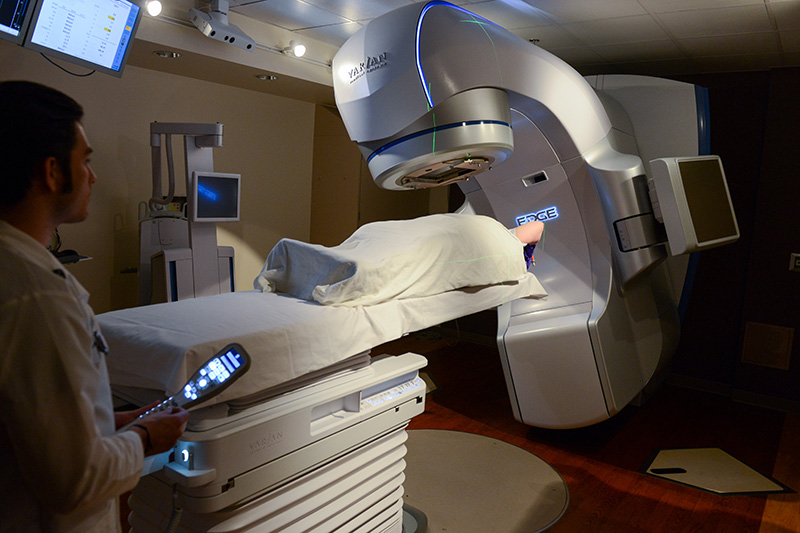Radiation Therapy for Colorectal Cancer
Radiation therapy uses strong beams of energy to destroy cancer cells. It’s a common treatment for colorectal cancer, especially rectal cancer and anal cancer. At Henry Ford Health, our radiation therapy plans minimize side effects and preserve your quality of life.
Radiation therapy for colorectal cancer: the Henry Ford difference
.jpg?h=267&w=400&hash=FAB8D5BABF28B2DF5609228475AC6DFD) At our colorectal cancer program, you’ll find:
At our colorectal cancer program, you’ll find:
- Individualized care: Our radiation oncologists tailor treatment to your age, lifestyle, treatment goals, and the type and stage of cancer you have. Whenever possible, we try to preserve bowel, urinary and sexual function so you can live the life you want.
- Multispecialty team: Radiation oncologists meet regularly with radiation physicists, medical oncologists, surgeons, colorectal nurses, pathologists and other experts. Together, we carefully plan the timing and length of radiation therapy to meet your needs.
- National accreditation: Henry Ford is one of only 69 hospitals in the nation recognized by the National Accreditation Program for Rectal Cancer (NAPRC). NAPRC accreditation highlights our evidence-based methods for treating rectal cancer, which often include a combination of radiation therapy and chemotherapy (chemoradiation).
How we use radiation therapy for colon, rectal and anal cancer
Our experts offer both short- and long-course radiation therapy. Shorter courses are more convenient and can reduce radiation toxicity and side effects. Longer courses may reduce the need for invasive surgery or a permanent colostomy.
We offer:
- Radiation therapy for colon cancer: Radiation therapy is less common for colon cancer. We may use it after surgery, called adjuvant therapy, to destroy remaining cancer cells. Or we may use it as a palliative treatment to ease symptoms in people with advanced cancer.
- Radiation therapy for rectal cancer: Chemoradiation before surgery, called neoadjuvant therapy, is the most common treatment for rectal cancer. Radiation therapy reduces the likelihood of cancer returning after surgery. In some cases, it can even eliminate the need for surgery.
- Radiation therapy for anal cancer: Almost everyone with anal cancer gets radiation therapy. We typically do anal cancer surgery only if the cancer returns after radiation therapy.
Take the next step
Preserving your quality of life
 The rectum and anus are very sensitive parts of your body. We understand that radiation to these areas can cause discomfort and other side effects. That’s why your care team discusses your goals and preferences during treatment planning.
The rectum and anus are very sensitive parts of your body. We understand that radiation to these areas can cause discomfort and other side effects. That’s why your care team discusses your goals and preferences during treatment planning.
We focus on preserving:
- Bowel function: Radiation therapy may allow us to perform a less invasive, sphincter-sparing surgery . This procedure removes cancer while preserving bowel function, so you don’t need an ostomy and can use the bathroom normally.
- Sexual function: We work with patients on different ways they can position their bodies during treatment to reduce damage to healthy tissues around the rectum and anus. This approach can help preserve sexual function.
- Urinary function: Radiation to the pelvis can damage muscles and nerves in your urinary tract. We guide you on bladder preparation before treatment, which can help prevent problems such as incontinence or frequent urination.
- Fertility: Radiation to the genital and pelvic regions can affect fertility in men and women. If you may want to have children after treatment, your care team can tell you more about fertility preservation before cancer treatment.
Colorectal radiation therapy can cause uncomfortable side effects. Your care team works with experts in palliative care, pain medicine, integrative medicine and other specialties to help you manage side effects. You can also access our OncoStat Clinic, where you can receive same-day care.
Image-guided radiation therapy for colorectal cancer
At Henry Ford, we use the most sophisticated radiation technology to plan and deliver your treatment. Our experts:
- Use computer-assisted tools to map the exact location of the tumor
- Deliver radiation therapy using imaging guidance, providing exceptional precision
This approach spares healthy tissue and reduces side effects. In fact, Henry Ford was the first in the world to use a new MRI-guided radiation therapy system, illustrating our commitment to bringing cutting-edge treatments home to our patients.

.svg?iar=0&hash=F6049510E33E4E6D8196C26CCC0A64A4)

/hfh-logo-main--white.svg?iar=0&hash=ED491CBFADFB7670FAE94559C98D7798)